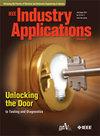Adaptive Harmonic Power Flow Algorithm for Hybrid AC/DC Transmission Systems Under Geomagnetic Disturbance Threats
IF 4.2
2区 工程技术
Q2 ENGINEERING, ELECTRICAL & ELECTRONIC
引用次数: 0
Abstract
With the ongoing integration of new generation resources and evolving load profiles in modern power systems, the presence of harmonic pollution in the electric power network is continuously on the rise. This level of waveform distortion in the electric power system, and its impact on the operation of energy delivery infrastructure, can no longer be neglected in high-voltage power systems. In this paper and beyond the state-of-the-art, an adaptive frequency-domain-based harmonic power flow (HPF) analytic is proposed for power systems with voltage source converter (VSC)-based high-voltage direct current (HVDC) transmission lines. The proposed algorithm uses a two-layer loop to estimate the initial modulation variables of the VSC. It updates the initial variable by calculating the first-order harmonic, ensuring that the adaptive effect of the HPF solution remains consistent regardless of any changes in the firing angle. The hybrid nonlinear model is applicable to both fundamental and harmonic power flow analyses at the point of common coupling, and also under the geomagnetic disturbance (GMD) events. To demonstrate the effectiveness of the proposed HPF algorithm in hybrid AC/DC transmission systems, a modified pulse width modulation (PWM)-controlled bi-terminal VSC-HVDC transmission system based on the IEEE 30-bus test system is used as a testbed. Simulation results and numerical analyses verify the effective performance of the proposed solution as compared to the conventional practices.求助全文
约1分钟内获得全文
求助全文
来源期刊

IEEE Transactions on Industry Applications
工程技术-工程:电子与电气
CiteScore
9.90
自引率
9.10%
发文量
747
审稿时长
3.3 months
期刊介绍:
The scope of the IEEE Transactions on Industry Applications includes all scope items of the IEEE Industry Applications Society, that is, the advancement of the theory and practice of electrical and electronic engineering in the development, design, manufacture, and application of electrical systems, apparatus, devices, and controls to the processes and equipment of industry and commerce; the promotion of safe, reliable, and economic installations; industry leadership in energy conservation and environmental, health, and safety issues; the creation of voluntary engineering standards and recommended practices; and the professional development of its membership.
 求助内容:
求助内容: 应助结果提醒方式:
应助结果提醒方式:


